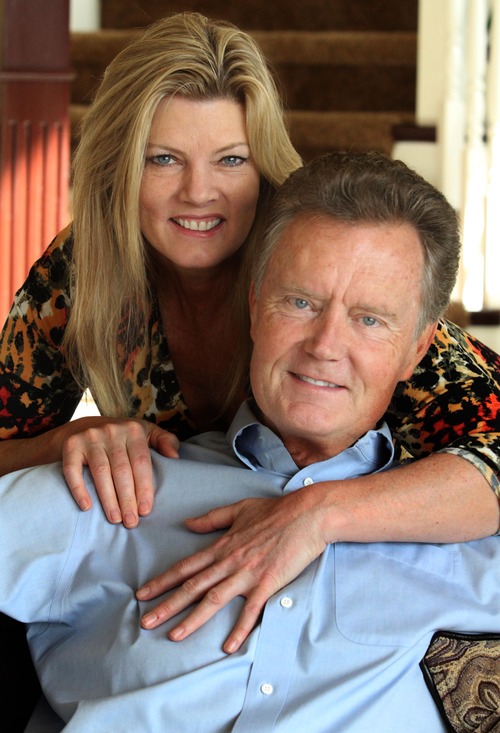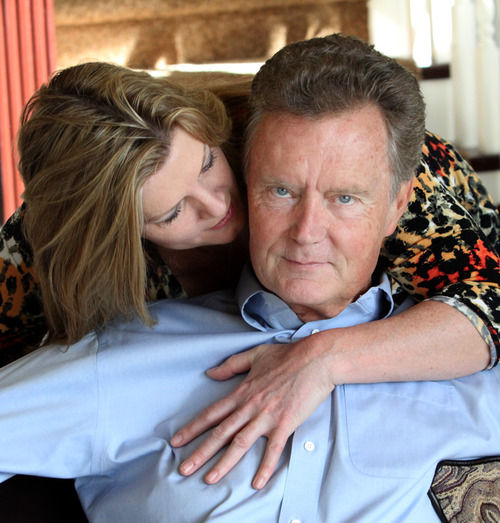This is an archived article that was published on sltrib.com in 2013, and information in the article may be outdated. It is provided only for personal research purposes and may not be reprinted.
Determined to defy the odds, influential Utah economist Jeff Thredgold a couple of months ago set in motion a quixotic effort to salvage a piece of his long career before an incurable brain illness destroyed what remained of his life.
It didn't work out.
Now the man who once traveled the country speaking dozens of times a year, appeared regularly on financial news channels and advised some of the biggest banks in the country, is locked into a world that is growing increasingly dark with no hope of recovery. He has chosen to spend the time he has remaining with his family, traveling and playing golf while he can still enjoy them.
Thredgold, 62, has behavior-variant frontotemporal degeneration (FTD), a condition akin to Alzheimer's disease. But rather than destroying memory, FTD attacks behavior and language. As FTD worsens, patients find it increasingly difficult to organize their lives, act properly in public and care for themselves at home. There is no cure. Most people die within 10 years of their diagnosis.
But Thredgold wasn't giving up. Diagnosed in July 2012, he refused to believe he was sick, even though his erratic behavior had begun to alarm his family. Just three weeks ago, Thredgold acknowledged that while he was "legally" and "technically" ill, he still wasn't convinced. A drug he started in December had "arrested" the disease, he said. Feeling fit, he was lining up speaking engagements, and had just signed a deal to give a talk in Las Vegas next month. It would be his first since doctors determined he had FTD.
"I feel great. I weigh 4 pounds more than when I graduated from high school. My golf game is the best it's ever been. I feel good," Thredgold said at the time.
But as the Vegas engagement loomed, and as other speaking offers trickled in, Thredgold began to have doubts. Last summer, his doctors had suggested that he not speak publicly again. Thredgold's wife, Lynnette, questioned whether her husband, a showman who used to speak around the country numerous times a year commanding $12,500 per talk, plus expenses, could still entertain an audience. Then there was a dicey question to ponder. Was Thredgold obligated to disclose his illness to potential clients?
Thredgold began to wonder, too. Last week, he decided the retirement FTD had forced on him last year would have to be permanent.
"This decision is not easy, but it is for the best," Thredgold wrote in an email to The Salt Lake Tribune.
"Too many athletes, too many business leaders, too many speakers have stayed too long in the professions, only to see their skills erode noticeably. After speaking nearly 2,000 times in 49 states and numerous countries over the past 25 years, I will try to go out near the top," he said.
—
Shrewd observer
Except in some circles, Thredgold is probably not a name that many Utahns know. Even so, he has been highly influential. He has helped people for years understand the economy and financial markets, both as a public speaker and a prolific writer and as a shrewd observer regularly called on by Utah and national media for his insights. For 23 years, he was KeyCorp's chief economist. Later, he did consulting work for Zions Bank, a relationship that lasted more than 15 years until he told the bank he was ill.
The parting was difficult, even humiliating.
"I was brutally honest with them ... and I think it scared them a little bit," Thredgold said. "I think they were looking for an opportunity to stop the relationship, just because I think they didn't want me to embarrass them, whether speaking or doing an interview."
Thredgold's blunt declaration may or may not be a sign of his illness. Physicians say unguarded remarks are symptomatic of the lack of behavioral control that many people with FTD have. If nothing else, it illuminates the corrosion that FTD can inflict on the spirit of a once vibrant mind. How people struggling with the disease interpret the ways others treat them can almost be as destructive as the FTD itself.
"People are funny," said Lynnette Thredgold, who believes Zions' treatment of her husband undermined his pride. "People are afraid of anyone sick. I mean, people treat you differently. And I see it. He might not see it. But I do."
While the Thredgolds feel resentful toward Zions, the bank has only praise for its "brilliant" former consultant. Spokesman Rob Brough wouldn't discuss the circumstances of Thredgold's departure last year, but he said the bank thought highly of him.
"We are deeply appreciative of the contributions that Jeff made to Zions Bank for more than a decade as our economic consultant. His advice, his insights were extremely valuable to us for many, many years. We really appreciate Jeff and are grateful for all he's contributed," Brough said.
—
FTD strikes earlier
If Thredgold had rebuilt his professional life, he would have accomplished what most people with FTD have been unable to achieve. Norman Foster, a neurology professor at the University of Utah medical school and director of its Center for Alzheimer's Care, Imaging and Research, said FTD is a "relentless, progressive" killer that physicians can help their patients manage with guidance and assistance. But, Foster adds, "we don't know how to stop the disease."
Thredgold became Foster's patient on Thursday. Earlier last week, because Foster hadn't met Thredgold yet and wasn't barred by patient-doctor ethical restrictions, Foster agreed to speak to The Tribune about the disease. Since he hadn't independently corroborated the presence of FTD, nothing Foster said should be construed to apply to Thredgold.
Unlike Alzheimer's, FTD usually strikes people earlier in their lives and is far less common. The average onset of FTD is between 50 and 55; Alzheimer's typically starts around age 75. For every 10 cases of Alzheimer's, there is only one FTD diagnosis, Foster said.
No single test can confirm FTD, so it isn't an easy diagnosis to make. A number of things must be done to be certain, Foster said. They include a detailed examination of the patient's nervous system and tests that evaluate comprehension, as well as a battery of checks such as spinal taps, EEGs and CT scans to rule out other diseases.
Because FTD affects behavior, it's not surprising that some people think a person with the disease is mentally disturbed. Some patients become hyperactive. Others sink into apathy. Impulsive acts can include shoplifting and grabbing food from another person's plate. Drug and alcohol abuse is not uncommon. Neither are sexual offenses.
"It is often misdiagnosed, and can be confused with a psychiatric illness, so it's something that needs to be evaluated carefully and completely," Foster said.
—
Seeing the effects
Signs that something was amiss surfaced more than a year before doctors determined why Thredgold was sick. Lynnette Thredgold remembers a telephone call from her husband in April 2011. In his hand was a set of keys. Thredgold knew they were his, but he didn't know which key opened which lock.
"I thought he was stroking, that he was having a seizure or something. I had the ambulance come, the paramedics come and test him out. And then we took him to the hospital. They called it a TIA (transient ischemic attack), which is a precursor to a stroke. But looking back now, we realize that [it] was literally part of the disease," she said.
"Then he started to be 'normal,' but we went on a vacation to London that summer, and I look back at his spending habits, the way he spent in London. I always usually trust what he says, 'oh let's do this. Let's do this.' But we were atrocious when it came to spending, and now I realize ... that is what happens with this disease. You have no concept of money, in that sense. [Jeff] can't stand to hear that, because he doesn't think he's ever not had a concept of money. But he didn't," Lynnette said.
The disease has exacted a toll on everyone in Thredgold's family. The naturally doting husband and father became withdrawn and cantankerous. Things were so bad that Lynnette considered filing for divorce last fall.
Income from speaking and consulting work dried up. Their 7,700-square-foot home of two decades in Farmington is for sale. Extravagant birthday and Christmas gifts to his six children and 13 grandchildren were eliminated. Money became so tight that, with his wife's permission, Thredgold canceled their health insurance policy, despite having spent 17 days in the hospital over the past year. The savings make it easier to afford hefty premiums for a life insurance policy to support Lynnette after Thredgold is gone.
"It's a risk, but [at] $2,200 a month [for health insurance], the income is not there," Thredgold said.
Still, the Thredgolds believe they can afford for Jeff to retire. A pension from KeyCorp will kick in soon. The couple were big investors in a technology company one of Lynnette's brothers started. The investment will pay off handsomely when the company is sold in a few years, they said.
—
Medication helps
Meanwhile, the drug Thredgold began taking last year, a mood stabilizer called Gabapentin, is making life easier for Thredgold. The medication won't impede the progress of FTD, but it does seem to mask some of his behavioral problems.
"I'd say it's stabilized me from some of the nights of no sleep, what would be for me some unusual behaviors [is] now giving way to stability, predictability and calm," he said.
Lynnette has noticed. In January, she felt it was safe to go on a cruise with Thredgold. Two months earlier, she wouldn't have dared. But the drug had smoothed out her husband's moods. And the weeklong voyage through the Caribbean seemed to relax him further. It gradually dawned on Lynnette that she and Jeff were behaving like old friends again. As she loosened up, Jeff responded in kind. The tension that had nearly wrecked their marriage dissolved.
That hard-won understanding may be the single most consoling aspect of the Thredgolds' ordeal. Lynnette has learned to treat her husband as if he is normal. It's a lesson that everyone should learn, she said. As the country ages, FTD, Alzheimer's and other neurological disorders are becoming more prevalent.
"It's just going to be a major thing in our society, more than people want to admit," she said.
"So we have to change our ways. We have to figure out something. We can't treat them like we've been treating them, which I think people do because they don't know.
"Now I just have a bigger understanding, and I'm not afraid anymore," she said.
Twitter: @sltribpaul —
Who is Jeff Thredgold?
• Economist, professional speaker
• Consulting economist, Zions Bank, 16 years
• Chief economist, KeyCorp, 23 years
• Author of several books and newsletters
• Appeared numerous times on CNBC, CNN
• Adjunct professor of finance, University of Utah, 16 years
• Bachelor's degree, business administration, Weber State University
• Master's degree, economics, University of Utah —
FTD, as it's also called, is a disease that damages the frontal and temporal lobes of the brain. The progressive, incurable disease causes radical changes in personality. Patients have difficulty controlling their behavior, which often leads to inappropriate conduct. Language also may become impaired. The Association for Frontotemporal Degeneration will hold its annual meeting in Salt Lake City on April 12.











